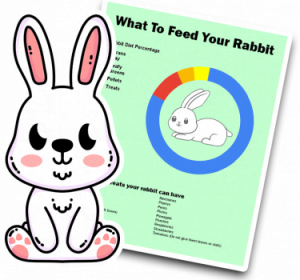

Mites are a common parasite for pet rabbits, known as the Rabbit Ear Mite or Psoroptes cuniculi, you will often find affected rabbits seen to shake their head and scratch their ears regularly. Some rabbits develop an ear canker which is caused by the mites irritating the lining of the ear, this results in an oozing-like serum and a build-up of thick crust (Keratin) in the ear canal.
Note: You need to get mites and other parasites seen as soon as possible as mites can carry other diseases which can impact your rabbit’s immune system.

How do you know if your rabbit has mites? Rabbit Mites can have a wide range of signs that vary in severity. The most common sign is constant scratching (Often mistaken for Lop rabbits and ear infections) which can lead to skin lesions and pain. Unfortunately, this is just the start, this can also lead to Fur Loss and excessive dandruff, both of which are a sign of complete infestation and Cheyetiella Parasitivoria.
The typical life cycle of mites is around 3 weeks. This means once they have grown from larvae, through to nymphs and then adults, they will have started feeding on the layer of keratin on your rabbit’s skin.
These are the most common symptoms of rabbit mites:
Treatment usually does require a trip to the vet as they will need to determine the type of ear mite which is causing your rabbit’s problems, this is usually done by taking a skin sample of the Keratin Layer in their inner ears.
Once the diagnosis of the type of mite has been completed, you will be given medication to supply your rabbit, this is usually Ivermectin or Selamectin (Commonly used as dewormers). You may be given antibiotics for the lesions in their ears as the mites can damage your rabbit’s ear tissue.
If you have multiple rabbits, it’s important to get them all treated at once and to clean their environment to avoid a repeat issue.
Whilst it is possible to use a home remedy for your rabbit, we highly suggest seeking attention from a veterinarian as your rabbit may need to be checked for any underlying diseases or damage done internally that may not be obvious.
Proper treatment against rabbit mites can prevent potential infection and death. The sooner you’re able to see a professional, the sooner your rabbit will recover and have a lower chance of infestation and long-term damage.
There are typically three main species of fur mites (Cheyletiella Mites) that can affect rabbits, cats & dogs, these are Cheyletiella yasguri, C. blakei & C. parasitivorax. However, Rabbits are prone to several types of mites which include:
Cleaning your rabbit’s environment is critical to ensuring that a mite infestation doesn’t keep reoccurring, this will involve vacuuming both the floors, any carpets or rugs, upholstery, and using an approved miticide powder (Aso known as Acaricide). Whilst the miticide powder is down, your rabbit will not be allowed in that area, so make sure you set them up in a temporary living space.
Depending on which miticide product you use, you may need to use multiple layers between using it and vacuuming to kill the eggs and any leftover mites. Additionally, you will need to take all your rabbit’s toys that can be washed and cleaned and put them in warm soapy water to soak them before cleaning them.
Lastly, if you keep your rabbit in a cage, you will need to remove all their bedding and clean their cage with miticide and then soapy water.
Unfortunately, Mites are something that can easily be introduced into your environment via outside intervention. For example, simply going for a walk or being around other household pets like dogs or cats can introduce mites to your rabbits.
In some locations, you may find that your rabbit’s bedding is the source of mites, especially during Autumn which is particularly popular for harvest mites.
Whilst it may impossible to completely prevent mites, don’t worry too much, keeping an eye on your rabbit’s behavior should keep everything under control, and stopping it from spreading can be done with thorough cleaning apparatus.

By entering your email address you agree to receive emails from Cottontailclub. We'll respect your privacy and you can unsubscribe at any time.